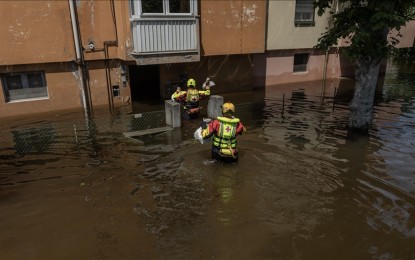
DISASTER. Volunteers accompany two divers from the Italian Coast Guard and two volunteers from the Italian Red Cross in delivering cooked meals and drinking water to families isolated by flooding in Conselice, Emilia-Romagna on May 23, 2023. Reports said at least 17 people were killed and 37,000 were displaced. (Photo courtesy of Anadolu)
MANILA – Europe has reported an increasing risk of mosquito-borne diseases, more frequent heat waves and flooding, and severe weather conditions like summers getting longer and warmer.
Climate Change Commission (CCC) commissioner Albert dela Cruz Sr. has warned that the situation in Europe could also happen to the Philippines, considering that it is one of the world’s most vulnerable countries to the impacts of climate change and global warming.
In a statement on Saturday, dela Cruz cautioned against the dire impact of climate change on public health and emphasized the need for immediate climate action to address the serious health risks among the general population, particularly the critically vulnerable and marginalized sectors.
“We realize that there is no disease group that is immune to the effects of climate change. And this is why we need to act now so we can respond to the threats to maintain a healthy population and with that attain economic stability through resiliency and sustainability,” he said, reacting to the European Centre for Disease Prevention and Control (ECDC) report published on June 22.
The ECDC said more cases and possibly deaths from diseases, such as dengue, chikungunya, and West Nile fever, are expected in the continent.
“Efforts need to focus on ways to control mosquito populations, enhancing surveillance and enforcing personal protective measures,” the report said.
That Europe is experiencing a warming trend creates more favorable conditions for invasive mosquito species, such as Aedes albopictus and Aedes aegypti, according to the ECDC.
As of June 8 this year, a total of 2,162,214 cases and 974 dengue deaths have been reported globally, based on the data from the ECDC.
“The health of populations will be in greater danger with climate change affecting health both directly, for instance, among the elderly who experience heat stroke due to exposure to extreme heat, or indirectly, when climate change alters the environmental conditions for mosquito-borne diseases, like dengue and malaria,” dela Cruz said.
The World Health Organization (WHO) has projected that between 2030 and 2050, climate change will cause approximately 250,000 additional deaths per year because of heat stress, malaria, diarrhea, and malnutrition alone.
Direct damage costs to health are estimated to be between USD2 billion and USD4 billion per year by 2030, according to the WHO report, adding that areas with weak health infrastructure, mostly in developing countries, will be the least able to cope without assistance.
The Philippine Development Plan 2023-2028 period devotes an entire chapter to climate change and disaster resiliency.
The pioneering chapter identifies key objectives for climate action, including increasing climate and disaster risk resilience of communities and institutions, enhancing ecosystem resilience, and enabling the transition to a low-carbon economy.
The Philippines reiterated the need to expand and enhance international cooperation in adaptation, mitigation, loss and damage, climate finance, and other means of implementation, such as technology transfer and capacity development toward transformative climate action.
“Under the Marcos administration, accelerating climate action and enhancing climate resilience have been more firmly embedded in our development agenda, which we project will lead to more flow of resources, including Means of Implementation,” CCC vice chairperson and executive director Robert EA Borje said at the 58th Sessions of the Subsidiary Body for Scientific and Technological Advice and the Subsidiary Body for Implementation of the United Nations Framework Convention for Climate Change held in Bonn, Germany on June 5-15. (PNA)
